Civil Disobedience: Comparing Thoreau, Gandhi, and King's Actions
VerifiedAdded on 2023/05/29
|5
|1377
|98
Essay
AI Summary
This essay examines the concept of civil disobedience through the lens of three influential figures: Henry Thoreau, Mahatma Gandhi, and Dr. Martin Luther King Jr. It begins by defining civil disobedience as the act of disobeying laws to pressure governments for just laws. The essay delves into Thoreau's philosophical justifications, emphasizing the importance of individual conscience over governmental dictates. It then explores Gandhi's use of civil disobedience in South Africa and India, highlighting his commitment to peace and nonviolent resistance. Finally, it discusses Dr. King's leadership in the civil rights movement, emphasizing his commitment to peaceful protest and his influence from both biblical teachings and Gandhi's philosophy. The essay contrasts the approaches of these leaders, highlighting their motivations and the contexts of their actions, while also discussing the similarities in their approaches and philosophies. The essay concludes with a personal reflection on the necessity and effectiveness of civil disobedience in contemporary society.
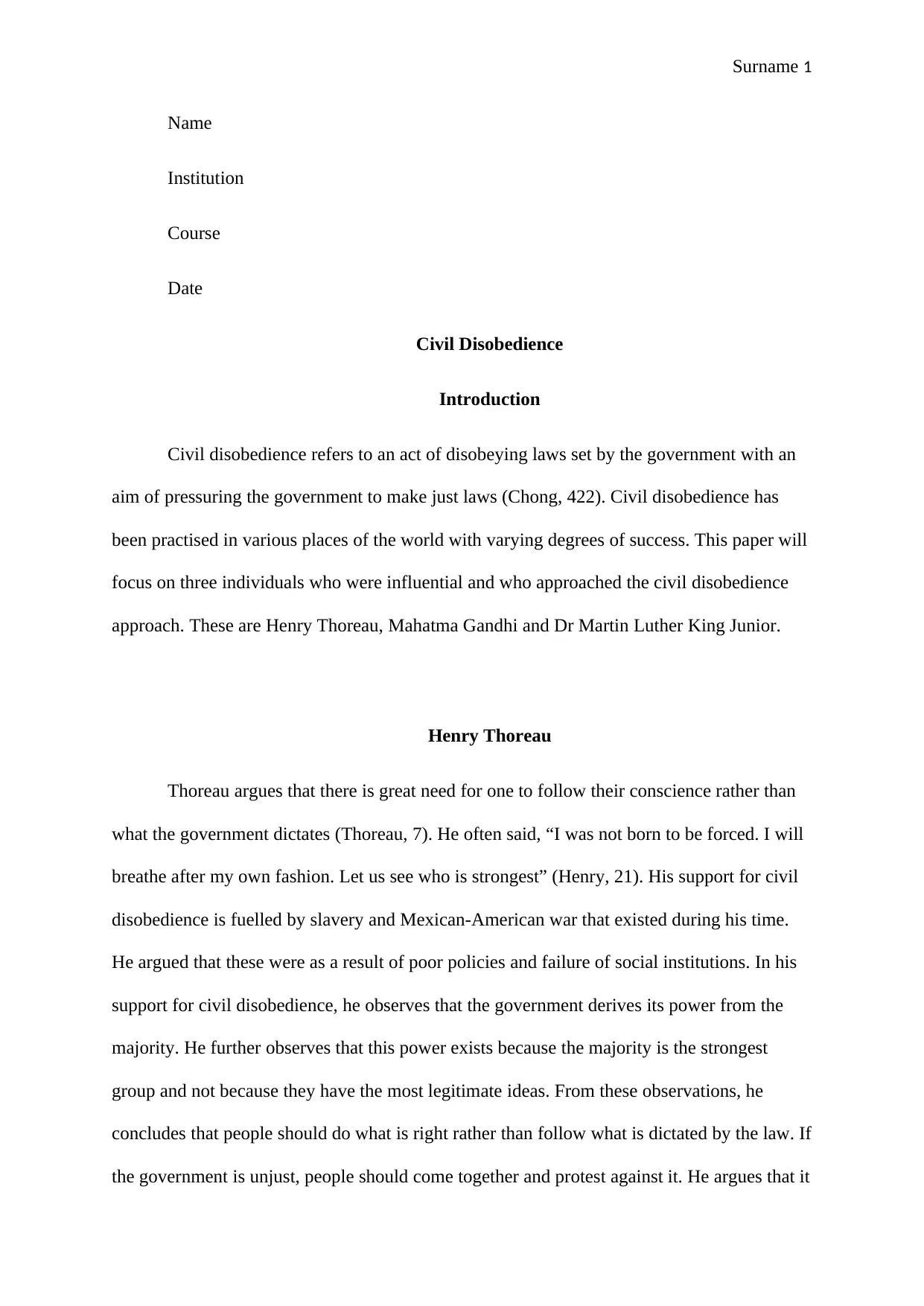
Surname 1
Name
Institution
Course
Date
Civil Disobedience
Introduction
Civil disobedience refers to an act of disobeying laws set by the government with an
aim of pressuring the government to make just laws (Chong, 422). Civil disobedience has
been practised in various places of the world with varying degrees of success. This paper will
focus on three individuals who were influential and who approached the civil disobedience
approach. These are Henry Thoreau, Mahatma Gandhi and Dr Martin Luther King Junior.
Henry Thoreau
Thoreau argues that there is great need for one to follow their conscience rather than
what the government dictates (Thoreau, 7). He often said, “I was not born to be forced. I will
breathe after my own fashion. Let us see who is strongest” (Henry, 21). His support for civil
disobedience is fuelled by slavery and Mexican-American war that existed during his time.
He argued that these were as a result of poor policies and failure of social institutions. In his
support for civil disobedience, he observes that the government derives its power from the
majority. He further observes that this power exists because the majority is the strongest
group and not because they have the most legitimate ideas. From these observations, he
concludes that people should do what is right rather than follow what is dictated by the law. If
the government is unjust, people should come together and protest against it. He argues that it
Name
Institution
Course
Date
Civil Disobedience
Introduction
Civil disobedience refers to an act of disobeying laws set by the government with an
aim of pressuring the government to make just laws (Chong, 422). Civil disobedience has
been practised in various places of the world with varying degrees of success. This paper will
focus on three individuals who were influential and who approached the civil disobedience
approach. These are Henry Thoreau, Mahatma Gandhi and Dr Martin Luther King Junior.
Henry Thoreau
Thoreau argues that there is great need for one to follow their conscience rather than
what the government dictates (Thoreau, 7). He often said, “I was not born to be forced. I will
breathe after my own fashion. Let us see who is strongest” (Henry, 21). His support for civil
disobedience is fuelled by slavery and Mexican-American war that existed during his time.
He argued that these were as a result of poor policies and failure of social institutions. In his
support for civil disobedience, he observes that the government derives its power from the
majority. He further observes that this power exists because the majority is the strongest
group and not because they have the most legitimate ideas. From these observations, he
concludes that people should do what is right rather than follow what is dictated by the law. If
the government is unjust, people should come together and protest against it. He argues that it
Paraphrase This Document
Need a fresh take? Get an instant paraphrase of this document with our AI Paraphraser
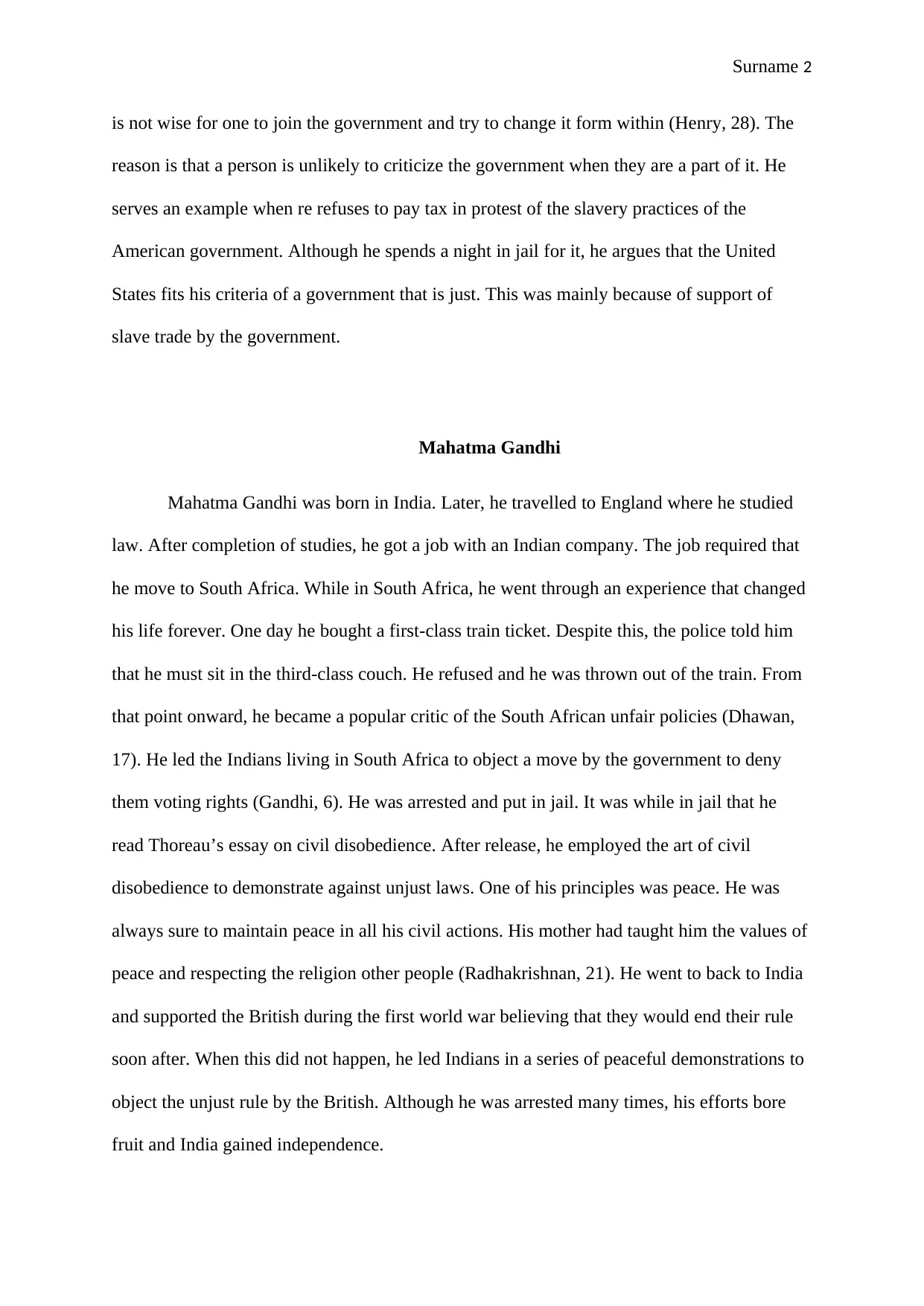
Surname 2
is not wise for one to join the government and try to change it form within (Henry, 28). The
reason is that a person is unlikely to criticize the government when they are a part of it. He
serves an example when re refuses to pay tax in protest of the slavery practices of the
American government. Although he spends a night in jail for it, he argues that the United
States fits his criteria of a government that is just. This was mainly because of support of
slave trade by the government.
Mahatma Gandhi
Mahatma Gandhi was born in India. Later, he travelled to England where he studied
law. After completion of studies, he got a job with an Indian company. The job required that
he move to South Africa. While in South Africa, he went through an experience that changed
his life forever. One day he bought a first-class train ticket. Despite this, the police told him
that he must sit in the third-class couch. He refused and he was thrown out of the train. From
that point onward, he became a popular critic of the South African unfair policies (Dhawan,
17). He led the Indians living in South Africa to object a move by the government to deny
them voting rights (Gandhi, 6). He was arrested and put in jail. It was while in jail that he
read Thoreau’s essay on civil disobedience. After release, he employed the art of civil
disobedience to demonstrate against unjust laws. One of his principles was peace. He was
always sure to maintain peace in all his civil actions. His mother had taught him the values of
peace and respecting the religion other people (Radhakrishnan, 21). He went to back to India
and supported the British during the first world war believing that they would end their rule
soon after. When this did not happen, he led Indians in a series of peaceful demonstrations to
object the unjust rule by the British. Although he was arrested many times, his efforts bore
fruit and India gained independence.
is not wise for one to join the government and try to change it form within (Henry, 28). The
reason is that a person is unlikely to criticize the government when they are a part of it. He
serves an example when re refuses to pay tax in protest of the slavery practices of the
American government. Although he spends a night in jail for it, he argues that the United
States fits his criteria of a government that is just. This was mainly because of support of
slave trade by the government.
Mahatma Gandhi
Mahatma Gandhi was born in India. Later, he travelled to England where he studied
law. After completion of studies, he got a job with an Indian company. The job required that
he move to South Africa. While in South Africa, he went through an experience that changed
his life forever. One day he bought a first-class train ticket. Despite this, the police told him
that he must sit in the third-class couch. He refused and he was thrown out of the train. From
that point onward, he became a popular critic of the South African unfair policies (Dhawan,
17). He led the Indians living in South Africa to object a move by the government to deny
them voting rights (Gandhi, 6). He was arrested and put in jail. It was while in jail that he
read Thoreau’s essay on civil disobedience. After release, he employed the art of civil
disobedience to demonstrate against unjust laws. One of his principles was peace. He was
always sure to maintain peace in all his civil actions. His mother had taught him the values of
peace and respecting the religion other people (Radhakrishnan, 21). He went to back to India
and supported the British during the first world war believing that they would end their rule
soon after. When this did not happen, he led Indians in a series of peaceful demonstrations to
object the unjust rule by the British. Although he was arrested many times, his efforts bore
fruit and India gained independence.
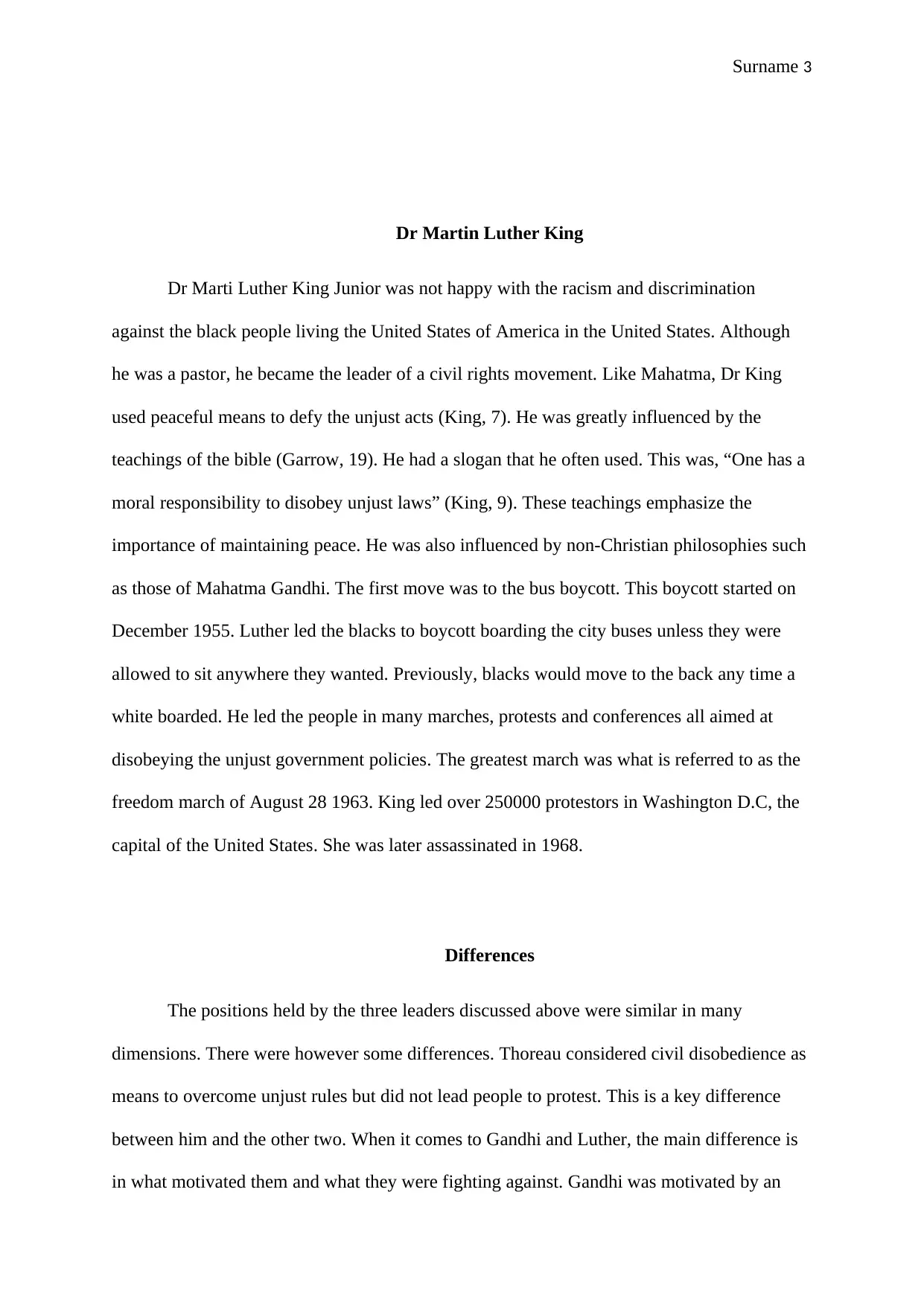
Surname 3
Dr Martin Luther King
Dr Marti Luther King Junior was not happy with the racism and discrimination
against the black people living the United States of America in the United States. Although
he was a pastor, he became the leader of a civil rights movement. Like Mahatma, Dr King
used peaceful means to defy the unjust acts (King, 7). He was greatly influenced by the
teachings of the bible (Garrow, 19). He had a slogan that he often used. This was, “One has a
moral responsibility to disobey unjust laws” (King, 9). These teachings emphasize the
importance of maintaining peace. He was also influenced by non-Christian philosophies such
as those of Mahatma Gandhi. The first move was to the bus boycott. This boycott started on
December 1955. Luther led the blacks to boycott boarding the city buses unless they were
allowed to sit anywhere they wanted. Previously, blacks would move to the back any time a
white boarded. He led the people in many marches, protests and conferences all aimed at
disobeying the unjust government policies. The greatest march was what is referred to as the
freedom march of August 28 1963. King led over 250000 protestors in Washington D.C, the
capital of the United States. She was later assassinated in 1968.
Differences
The positions held by the three leaders discussed above were similar in many
dimensions. There were however some differences. Thoreau considered civil disobedience as
means to overcome unjust rules but did not lead people to protest. This is a key difference
between him and the other two. When it comes to Gandhi and Luther, the main difference is
in what motivated them and what they were fighting against. Gandhi was motivated by an
Dr Martin Luther King
Dr Marti Luther King Junior was not happy with the racism and discrimination
against the black people living the United States of America in the United States. Although
he was a pastor, he became the leader of a civil rights movement. Like Mahatma, Dr King
used peaceful means to defy the unjust acts (King, 7). He was greatly influenced by the
teachings of the bible (Garrow, 19). He had a slogan that he often used. This was, “One has a
moral responsibility to disobey unjust laws” (King, 9). These teachings emphasize the
importance of maintaining peace. He was also influenced by non-Christian philosophies such
as those of Mahatma Gandhi. The first move was to the bus boycott. This boycott started on
December 1955. Luther led the blacks to boycott boarding the city buses unless they were
allowed to sit anywhere they wanted. Previously, blacks would move to the back any time a
white boarded. He led the people in many marches, protests and conferences all aimed at
disobeying the unjust government policies. The greatest march was what is referred to as the
freedom march of August 28 1963. King led over 250000 protestors in Washington D.C, the
capital of the United States. She was later assassinated in 1968.
Differences
The positions held by the three leaders discussed above were similar in many
dimensions. There were however some differences. Thoreau considered civil disobedience as
means to overcome unjust rules but did not lead people to protest. This is a key difference
between him and the other two. When it comes to Gandhi and Luther, the main difference is
in what motivated them and what they were fighting against. Gandhi was motivated by an
⊘ This is a preview!⊘
Do you want full access?
Subscribe today to unlock all pages.

Trusted by 1+ million students worldwide
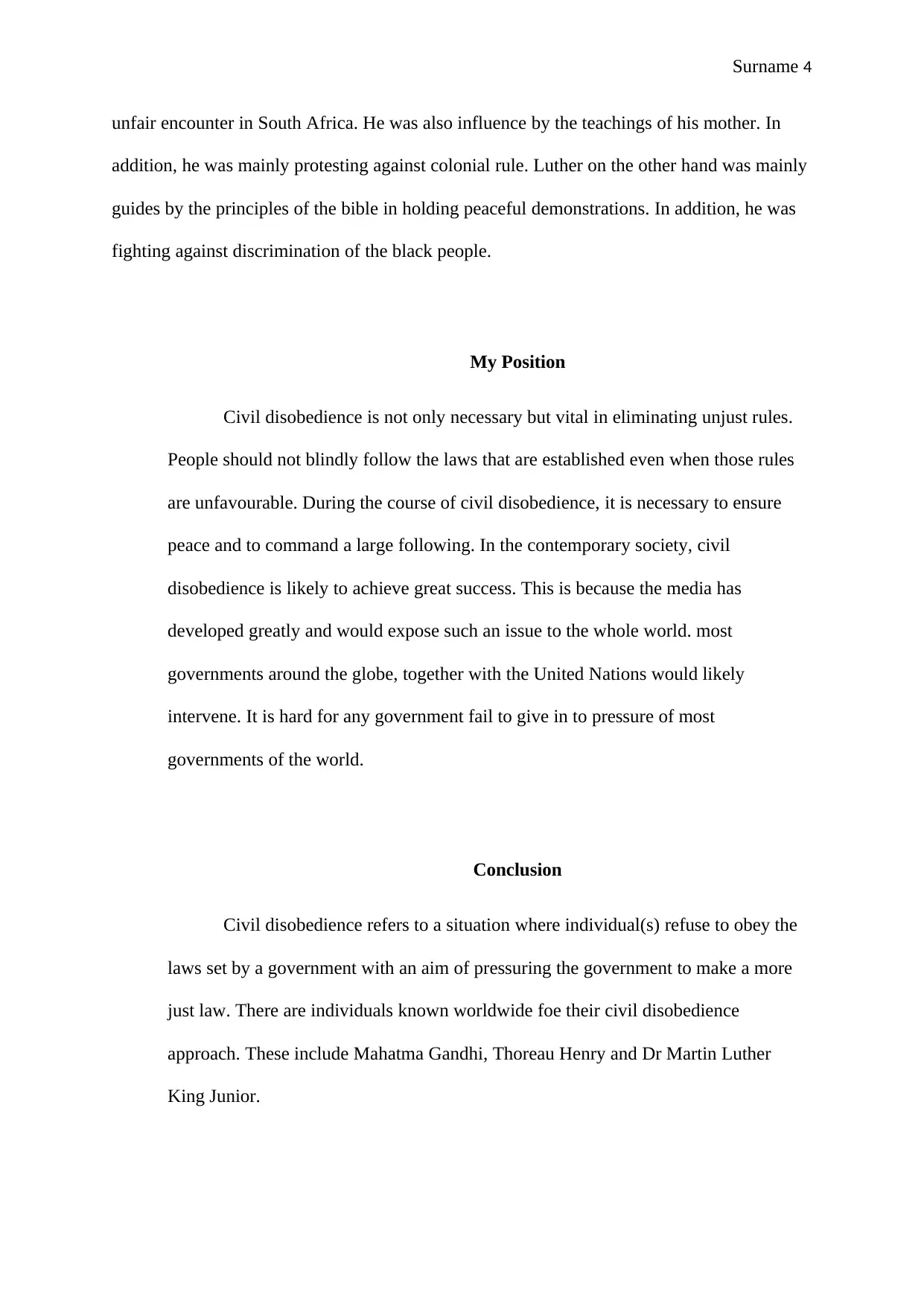
Surname 4
unfair encounter in South Africa. He was also influence by the teachings of his mother. In
addition, he was mainly protesting against colonial rule. Luther on the other hand was mainly
guides by the principles of the bible in holding peaceful demonstrations. In addition, he was
fighting against discrimination of the black people.
My Position
Civil disobedience is not only necessary but vital in eliminating unjust rules.
People should not blindly follow the laws that are established even when those rules
are unfavourable. During the course of civil disobedience, it is necessary to ensure
peace and to command a large following. In the contemporary society, civil
disobedience is likely to achieve great success. This is because the media has
developed greatly and would expose such an issue to the whole world. most
governments around the globe, together with the United Nations would likely
intervene. It is hard for any government fail to give in to pressure of most
governments of the world.
Conclusion
Civil disobedience refers to a situation where individual(s) refuse to obey the
laws set by a government with an aim of pressuring the government to make a more
just law. There are individuals known worldwide foe their civil disobedience
approach. These include Mahatma Gandhi, Thoreau Henry and Dr Martin Luther
King Junior.
unfair encounter in South Africa. He was also influence by the teachings of his mother. In
addition, he was mainly protesting against colonial rule. Luther on the other hand was mainly
guides by the principles of the bible in holding peaceful demonstrations. In addition, he was
fighting against discrimination of the black people.
My Position
Civil disobedience is not only necessary but vital in eliminating unjust rules.
People should not blindly follow the laws that are established even when those rules
are unfavourable. During the course of civil disobedience, it is necessary to ensure
peace and to command a large following. In the contemporary society, civil
disobedience is likely to achieve great success. This is because the media has
developed greatly and would expose such an issue to the whole world. most
governments around the globe, together with the United Nations would likely
intervene. It is hard for any government fail to give in to pressure of most
governments of the world.
Conclusion
Civil disobedience refers to a situation where individual(s) refuse to obey the
laws set by a government with an aim of pressuring the government to make a more
just law. There are individuals known worldwide foe their civil disobedience
approach. These include Mahatma Gandhi, Thoreau Henry and Dr Martin Luther
King Junior.
Paraphrase This Document
Need a fresh take? Get an instant paraphrase of this document with our AI Paraphraser
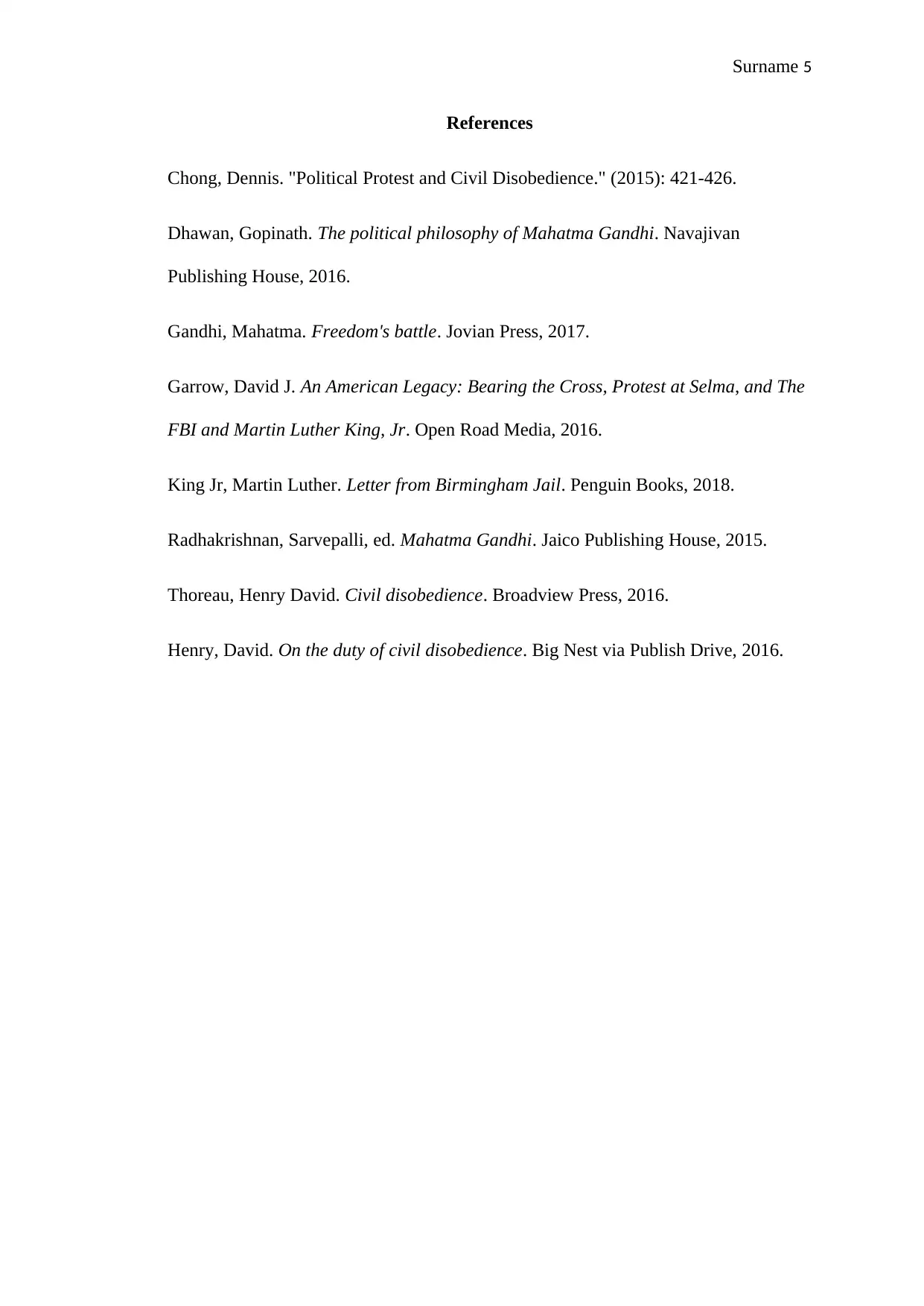
Surname 5
References
Chong, Dennis. "Political Protest and Civil Disobedience." (2015): 421-426.
Dhawan, Gopinath. The political philosophy of Mahatma Gandhi. Navajivan
Publishing House, 2016.
Gandhi, Mahatma. Freedom's battle. Jovian Press, 2017.
Garrow, David J. An American Legacy: Bearing the Cross, Protest at Selma, and The
FBI and Martin Luther King, Jr. Open Road Media, 2016.
King Jr, Martin Luther. Letter from Birmingham Jail. Penguin Books, 2018.
Radhakrishnan, Sarvepalli, ed. Mahatma Gandhi. Jaico Publishing House, 2015.
Thoreau, Henry David. Civil disobedience. Broadview Press, 2016.
Henry, David. On the duty of civil disobedience. Big Nest via Publish Drive, 2016.
References
Chong, Dennis. "Political Protest and Civil Disobedience." (2015): 421-426.
Dhawan, Gopinath. The political philosophy of Mahatma Gandhi. Navajivan
Publishing House, 2016.
Gandhi, Mahatma. Freedom's battle. Jovian Press, 2017.
Garrow, David J. An American Legacy: Bearing the Cross, Protest at Selma, and The
FBI and Martin Luther King, Jr. Open Road Media, 2016.
King Jr, Martin Luther. Letter from Birmingham Jail. Penguin Books, 2018.
Radhakrishnan, Sarvepalli, ed. Mahatma Gandhi. Jaico Publishing House, 2015.
Thoreau, Henry David. Civil disobedience. Broadview Press, 2016.
Henry, David. On the duty of civil disobedience. Big Nest via Publish Drive, 2016.
1 out of 5
Your All-in-One AI-Powered Toolkit for Academic Success.
+13062052269
info@desklib.com
Available 24*7 on WhatsApp / Email
![[object Object]](/_next/static/media/star-bottom.7253800d.svg)
Unlock your academic potential
Copyright © 2020–2026 A2Z Services. All Rights Reserved. Developed and managed by ZUCOL.